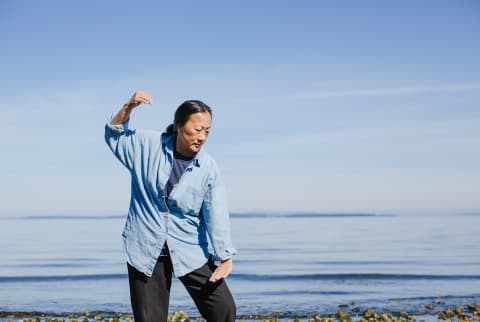Advertisement
Tai Chi Reduces Fall Risks For People With Dementia, Study Finds


For the young and resilient, falling down can lead to minor scrapes and a possible bruise to the ego. As we age, however, those once harmless falls can become serious health issues. People with dementia are twice as likely to fall as people who are cognitively intact, and because of increased frailty with age, those falls can lead to death. Recent research, though, found that practicing tai chi can reduce fall risk in people with dementia.
A study published recently in Clinical Interventions in Aging followed a group of 85 seniors with dementia who were living in a community home. Researchers asked 43 members of the group to resume normal care while the other 42 added tai chi to their daily routines for 20 weeks.
Tai chi is a gentle, repetitive, and relaxing mind-body exercise, according to lead author of the study Samuel Nyman, Ph.D. The slow movements make tai chi an easy and enjoyable exercise for older populations, so Nyman and the researchers felt they could safely add it to the routines of older people without risk. They were curious about whether the added exercise would improve balance and reduce fall risks in their participants.
After six months, Nyman found that the group who practiced tai chi in class and at home were less likely to fall as those who did not practice. Aside from physical health, practicing tai chi also improved the quality of life in people with dementia.
"They enjoyed coming to the classes, they enjoyed doing the tai chi and meeting other people in the same position as them," Nyman said. Caregivers of people with dementia were able to bring their patients to tai chi classes without added stress, he said, proving that the classes were beneficial and not burdensome.
Interestingly, results from balance tests remained the same for patients before and after practicing tai chi. Nyman said more research needs to be done to determine the link between tai chi and reduced falls if balance is unrelated.
"If it's not doing it through balance, is it doing it through the relaxation of mindfulness...muscle strength? There could be a range of things that we need to look at," Nyman said, but regardless of the link, these findings are positive and can benefit people across the country at risk for devastating falls.
While exercises like tai chi and chair yoga might be better suited for older audiences, working out during any phase of life can decrease your risk of developing dementia, so there's no better time to start than now.